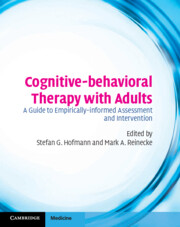Crossref Citations
This Book has been
cited by the following publications. This list is generated based on data provided by Crossref.
Abdulkader, Waleed Fathi Abdul Karim
2017.
The Effectiveness of a Cognitive Behavioral Therapy Program in Reducing School Bullying among a Sample of Adolescents with Learning Disabilities.
International Journal of Educational Sciences,
Vol. 18,
Issue. 1-3,
p.
16.
Misciagna, Sandro
2020.
Cognitive Behavioral Therapy - Theories and Applications.
Poh, Soon-Chang
Tan, Yi-Fei
Ooi, Chee-Pun
Tan, Wooi-Haw
Quek, Albert
Gan, Chee-Yong
Lee, Yew-Chun
Yap, Zhun-Hau
and
Cham, Chin-Leei
2021.
Computational Science and Technology.
Vol. 724,
Issue. ,
p.
383.
Kormas, Panagiotis
and
Moutzouri, Antonia
2022.
Handbook of Computational Neurodegeneration.
p.
1.
Kormas, Panagiotis
2022.
Stoic Cognitive Theories and Contemporary Neuropsychological Treatments.
Conatus,
Vol. 7,
Issue. 2,
p.
87.
Trifan, Alina
Salgado, Pedro
Ribeiro, João
and
Oliveira, José Luís
2022.
Early Detection of Mental Health Disorders by Social Media Monitoring.
Vol. 1018,
Issue. ,
p.
235.
MURADİ, Patrizia
2023.
FİNANSAL TERAPİ ÜZERİNE BİR DEĞERLENDİRME.
Uluslararası Anadolu Sosyal Bilimler Dergisi,
Vol. 7,
Issue. 2,
p.
329.
Kormas, Panagiotis
and
Moutzouri, Antonia
2023.
Handbook of Computational Neurodegeneration.
p.
261.



